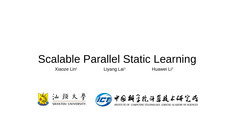报告详情
Scalable Parallel Static Learning
编号:45
访问权限:仅限参会人
更新:2021-08-19 20:58:17
浏览:552次
口头报告
摘要
Static learning is a learning algorithm for finding additional implicit implications between gates in a netlist. In automatic test pattern generation (ATPG) the learned implications help recognize conflicts and redundancies early, and thus greatly improve the performance of ATPG. Though ATPG can further benefit from multiple runs of incremental or dynamic learning, it is only feasible when the learning process is fast enough. In the paper, we study speeding up static learning through parallelization on heterogeneous computing platform, which includes multi-core microprocessors (CPUs), and graphics processing units (GPUs). We discuss the advantages and limitations in each of these architectures. With their specific features in mind, we propose two different parallelization strategies that are tailored to multi-core CPUs and GPUs. Speedup and performance scalability of the two proposed parallel algorithms are analyzed. As far as we know, this is the first time that parallel static learning is studied in the literature.
Speaker: Xiaoze Lin
Short bio: Xiaoze Lin received the B.S degree in Communication Engineering from Shantou University, Shantou, China in 2019. He is currently working toward the M.S degree in Electronics and Communications Engineering with the Department of Electronics, Shantou University, Shantou, China. His current research interests include very large scale integration design and test, and fault tolerant computing.
Speaker: Xiaoze Lin
Short bio: Xiaoze Lin received the B.S degree in Communication Engineering from Shantou University, Shantou, China in 2019. He is currently working toward the M.S degree in Electronics and Communications Engineering with the Department of Electronics, Shantou University, Shantou, China. His current research interests include very large scale integration design and test, and fault tolerant computing.
关键词
static learning;parallel acceleration;GPU;multi-core CPU
报告人
Xiaoze Lin
student Shantou UniversityXiaoze Lin received the B.S degree in Communication Engineering from Shantou University, Shantou, China in 2019. He is currently working toward the M.S degree in Electronics and Communications Engineering with the Department of Electronics, Shantou University, Shantou, China. His current research interests include very large scale integration design and test, and fault tolerant computing.
全部评论
重要日期
-
会议日期
08月18日
2021
至08月20日
2021
-
05月10日 2021
初稿截稿日期
-
08月16日 2021
提前注册日期
-
08月19日 2021
报告提交截止日期
-
08月20日 2021
注册截止日期
主办单位
IEEE
Tongji University
Chinese Computer Federation
Tongji University
Chinese Computer Federation
承办单位
Tongji University
联系方式
- Prof. Zhang Ying
- yi******@tongji.edu.cn
历届会议
-
2022年08月24日 台湾-中国 Taipei
2022 IEEE International Test Conference in Asia -
2019年09月03日 日本 Tokyo
2019 IEEE International Test Conference in Asia -
2018年08月15日 中国
2018 IEEE International Test Conference in Asia -
2017年09月13日 台湾-中国 Taipei
2017 IEEE International Test Conference in Asia -
2014年11月10日 中国 杭州市
IEEE International Test Conference in Asia



发表评论